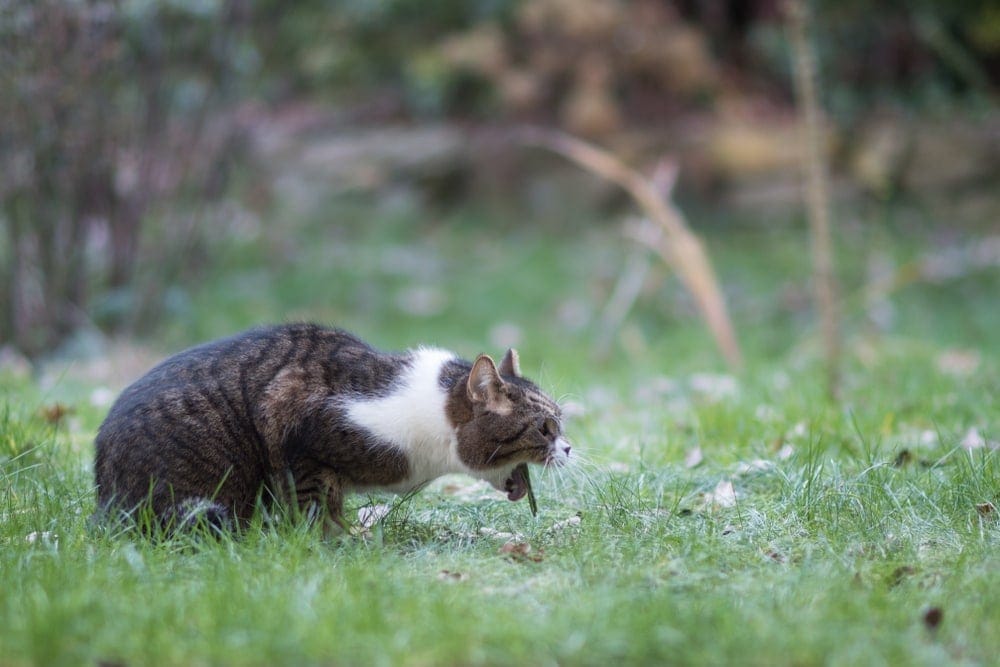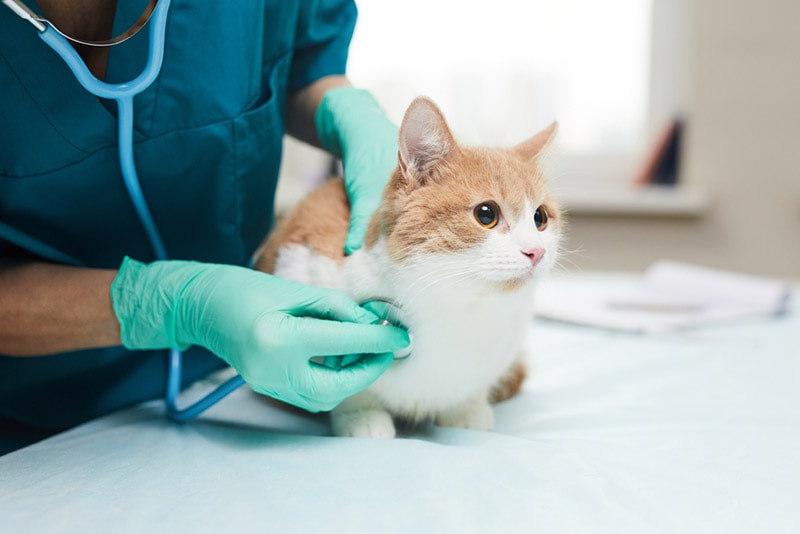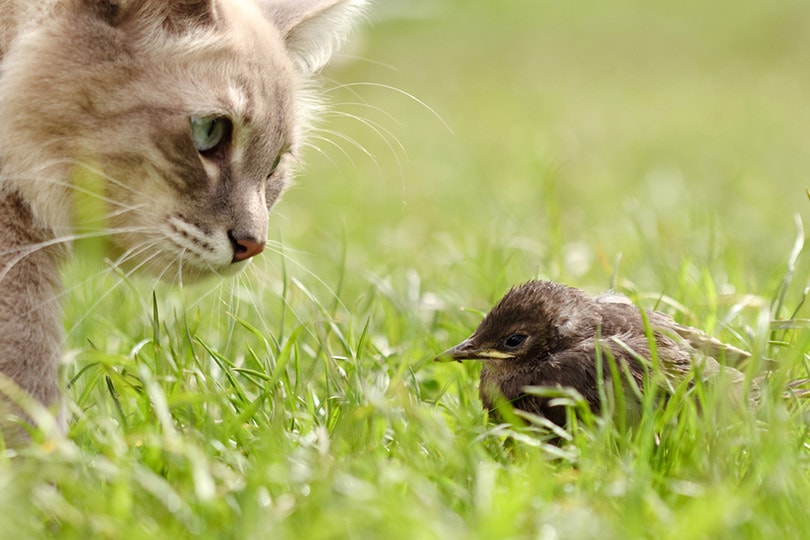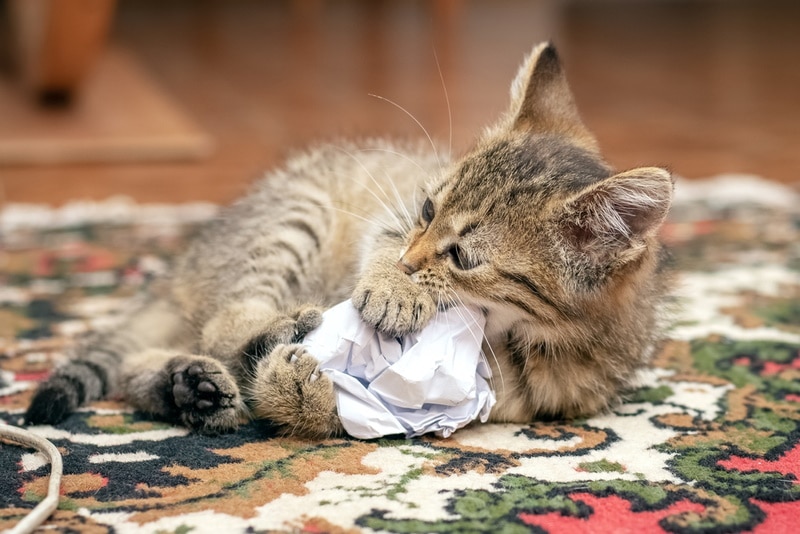What Is Cat Regurgitation? Vet Reviewed Tips & Differences From Vomiting
By Lorre Luther
Updated on

While we’d all like our cats to be happy and healthy day in and out, our pets occasionally feel less than wonderful. Cats sometimes have off days, which are often accompanied by tummy problems, and it can be quite worrying when a beloved cat starts having trouble keeping their food down. Before determining how to help your cat, it’s essential to understand the difference between regurgitation and vomiting.
Both result in cats bringing up food after eating, but the two processes differ. Regurgitation involves the esophagus and occurs when cats expel food before it has reached the stomach. Regurgitated food often comes out in a tubular shape and is accompanied by saliva. Cats vomit food that’s in the stomach, and the vomit often includes digestive fluids.
How Can I Tell if My Cat Is Vomiting or Regurgitating?
Distinguishing between regurgitation and vomiting can be tricky. However, there are several key differences between the two processes.
| Regurgitation | Vomiting |
| A passive process, there are no contractions of the abdomen during regurgitation | An active process, involves abdominal contractions and retching. Is painful for your cat |
| Almost always happens immediately or very shortly after a meal | May be associated with meals but may also happen at times not associated with meals |
| Looks and smells very similar to what your cat recently ate | Usually appears and smells slightly or very differently to what your cat ate, may also be mixed with digestive liquids (such as bile) |
| Usually indicates issues with your cat’s esophagus | Indicates issues with parts of your cat’s digestive system beyond their esophagus |
| Not very uncommon, normal in some circumstances | Uncommon, never considered normal |
| Some breeds may have a higher predisposition to regurgitation | There is no breed association with vomiting |
When Should I Contact a Veterinarian?
If your cat is healthy and only regurgitates once a month or less, possibly after eating too quickly or while passing a hairball, there’s likely nothing to be worried about. Contact your veterinarian if your kitty starts regurgitating more frequently or shows signs of illness, such as fatigue, weight loss, lethargy, or hiding. Contact your vet for guidance immediately if you suspect your cat has consumed something problematic.
And don’t be afraid to ask for help if you can’t tell the difference between vomiting and regurgitation. Consider taking a picture of what your cat produces to show your veterinarian. A video is even better for diagnostic purposes if you remember to grab your phone in time.
Remember to write down how often your cat appears to be having problems and when the issue started. Note what your cat eats and how long they usually start having problems after meals. Let your veterinarian know about any behavioral changes you observe as well.

What Causes Feline Regurgitation?
Feline regurgitation has several causes. In most instances, consistent or multiple incidences of regurgitation in a month are not considered normal. In such instances, the cause for regurgitation is an abnormality or condition affecting your cat’s esophagus. In other instances, regurgitation is often a stand-alone episode, often associated with your cat’s eating habits.
There are many conditions and ailments that can lead to regurgitation. These are some of the potential causes for your cat’s regurgitation habits.:
- Megaesophagus: This is the most common reason for regurgitation and is defined as a very large esophagus. This isn’t a disease itself but rather a condition that can be caused by other conditions or diseases. Siamese cats have a genetic predisposition to this condition.
- Esophagitis: This is an inflammation of the esophagus. At times, it may be caused by a history of certain medication use.
- Myasthenia Gravis: When cats are afflicted with this disease, their immune system attacks certain parts of their body that don’t allow nerve impulses to properly control muscle action. This can lead to a weak esophagus.
- Congenital Defects: Certain cats are born with ailments that affect the esophagus. The most common of these ailments is Persistent Right Aortic Arch.
- Foreign Bodies: Cats that eat a foreign object sometimes regurgitate in attempts to remove items that have become stuck. If you see your cat eat a button, bit of bone, or piece of yarn, consider it a medical emergency and contact your veterinarian immediately. Reach out for help if your cat is vomiting or regurgitating and you suspect they may have gotten into something problematic. Foreign objects that don’t pass through your cat’s body can develop into life-threatening obstructions.
- Tumors: Both benign (harmless) and malignant (often termed as cancerous) tumors that affect the esophagus can lead to your cat regurgitating.
- Quick Eaters: Eating too fast can cause cats of any age to regurgitate. Lick mats and food puzzles are great ways to slow fast eaters. They also provide a bit of fun and mental engagement, which are incredibly important for a cat’s well-being. Feeding cats wet food instead of kibble helps some pets as well. Pets in multi-cat homes sometimes eat too quickly when anxious or stressed regarding food access. Feeding pets separately can reduce resource competition and decrease the need for speedy eating.

Final Thoughts
Feline regurgitation is a relatively common occurrence. It’s usually nothing to be concerned about if it only happens occasionally. But contact your veterinarian right away if the problem starts occurring more frequently or your pet begins to show other signs of illness, such as lethargy, weight loss, or lack of appetite.
Call your veterinarian immediately if you suspect your cat has eaten a button, rubber band, or anything else that could cause an obstruction. Feline regurgitation can also be related to inflammatory and endocrine conditions, making the proper diagnosis an absolute must to ensure cats are treated appropriately.
Featured Image Credit: Nils Jacobi, Shutterstock












